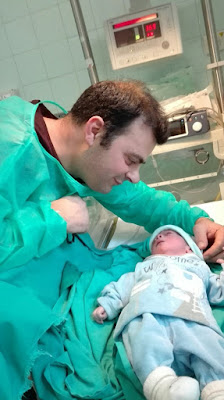We hoped to have time to open a dialogue after I finished the presentation at the International Montessori Congress in Prague. Sabrina and Elisa, two Italian trainers for Montessori 0-3, were ready to take part in the 'Questions and Answers' afterwards. They are the directors for two public Nidos (which means 0-3 in Italy) that serve over 100 children and the films I showed depicted the Montessori 0-3 research they have been engaged in for over 15 years.
The final slide of the Cosmic Task Powerpoint presentation
"You believe that the most important people in education are university professors; that the 20 year old son is more important because he costs more and is "grown up." ... But these are values that have nothing to do with the real price of things. One day, perhaps, the importance of the first year, of the newborn, of the moment of birth, will be understood and the pyramid will be inverted. The people who take care of man at the beginning of life will be considered quite differently." Adele Costa Gnocchi
Fulvio Honegger was at the table as well, he had introduced Grazia Honegger Fresco, his mother, telling us about her experiences with Montessori, at the age of four or five, when she went to a Casa dei Bambini run by Giuliana Sorge, one of Montessori's most qualified students and collaborators; and how Grazia was a direct student of Maria Montessori (1950 Rome course), Adele Costa Gnocchi (1947 Assistants to Infancy) and Anna Maria Maccheroni, (Montessori Music diploma) both of whom attended the first course in 1909.
Fulvio was also to help with translation of the questions and answers for Sabrina and Elisa. but unfortunately we ran out of time. At the next Congress it would be interesting to have a panel of 0-3 trainers who have worked with Grazia Fresco to simply talk about, and respond to questions, concerning their work in Montessori 0-3. This dialogue could be very enriching for the Montessori community as they have experimented with Montessori essential values, environments and materials in their programs and have "discovered the child" - amazing situations where the youngest children are experiencing deep concentration, independence, and spontaneous socialization.
Fulvio was also to help with translation of the questions and answers for Sabrina and Elisa. but unfortunately we ran out of time. At the next Congress it would be interesting to have a panel of 0-3 trainers who have worked with Grazia Fresco to simply talk about, and respond to questions, concerning their work in Montessori 0-3. This dialogue could be very enriching for the Montessori community as they have experimented with Montessori essential values, environments and materials in their programs and have "discovered the child" - amazing situations where the youngest children are experiencing deep concentration, independence, and spontaneous socialization.
I promised to answer all the questions - 22 very interesting questions - that I didn't have time to answer in Prague. I've decided to begin with the ones about the newborn since that is the natural place to start and I'll work my way up the developmental timeline. The first question will be answered in the next blog.
Question 1: How do you see “Assistants to Infants” aid in the work of birth and the first moments of a child’s life - both now and in the future?
This question was from Lesley Monet Neustein, M.Ed - Loyola University, AMI trained Assistants to Infancy, Birth Doula and Newborn Care Specialist. She works with families and infants from the very beginning - Montessori from Birth - helping parents prepare their home environment, educating them on birthing options and the special needs of the newborn, and providing support to the couple during and after birth. Her website, The Montessori Doula, will launch in early 2018.
The other two questions I received regarding newborns are:
Question 2: How can we convince and influence doctors and nurses about the importance of being attentive at birth?
Question 3: I am interested in observations of newborns. Where can I learn more about newborns?
This question is from Alenka Frangez who works full time as a technical assistant in a Laboratory for cell physiology and toxinology at the Faculty of Medicine at the University of Ljubljana in Slovenia. She also finds time to offer a Montessori Infant/Parent Class one afternoon a week for children from 10 to 30 months and aspires to do some scientific research comparing traditional and Montessori approaches to newborns and infants because she instinctively feels that we do not truly understand them or know how to handle them.
These three questions are extremely important if we are to open the dialogue between the world of birth practices and the Montessori world of sensitivity to the person, the child before us. I will address them in the context of my research in Italy where I am observing and studying the newborn and will weave in thoughts on the idea of bringing Montessori's wisdom and Adele Costa Gnocchi's research into the context of modern times.
Karin




Comments
Post a Comment